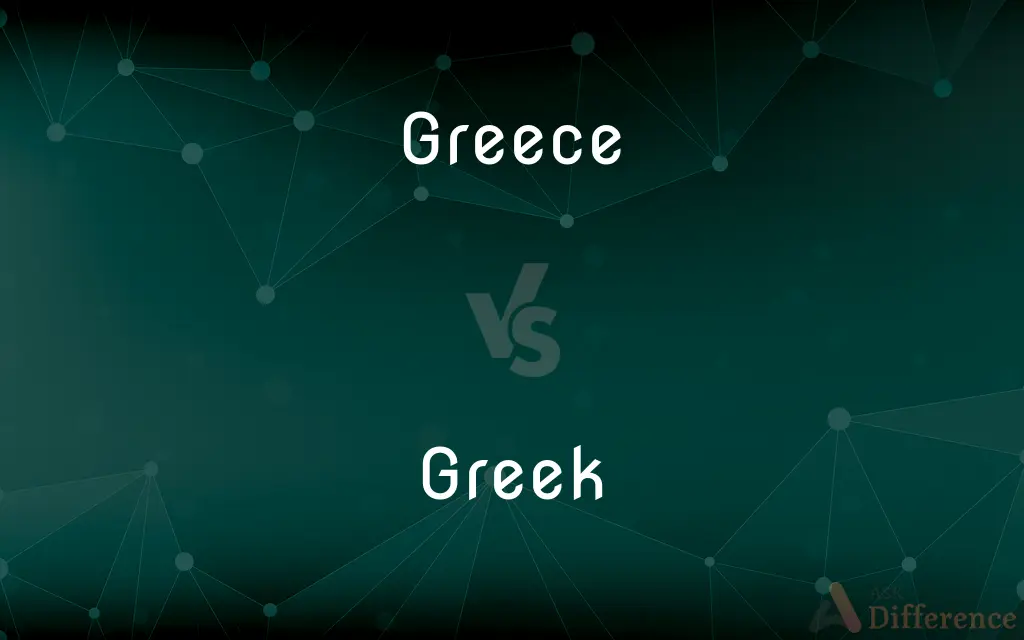Greece vs. Greek — What's the Difference?
By Urooj Arif & Maham Liaqat — Updated on March 31, 2024
Greece is a country in southeastern Europe, while Greek refers to anything related to Greece, including its culture, language, and people.

Difference Between Greece and Greek
Table of Contents
ADVERTISEMENT
Key Differences
Greece, officially known as the Hellenic Republic, is a country located in southeastern Europe, known for its rich history, archaeological sites, and beautiful islands. It's considered the cradle of Western civilization, democracy, and the Olympic Games. On the other hand, Greek pertains to anything related to Greece, including its culture, language, and people. This encompasses the Greek language, an independent branch of the Indo-European family of languages, and Greek culture, which has significantly influenced art, philosophy, and politics.
The geographical term "Greece" defines the nation's physical borders and territorial extent, from its mainland to the numerous islands scattered in the Aegean and Ionian Seas. Meanwhile, "Greek" as an adjective describes the characteristics, heritage, and attributes of the country and its inhabitants. For instance, Greek cuisine is celebrated worldwide for its emphasis on fresh ingredients and flavors, including dishes like moussaka and souvlaki.
In historical contexts, Greece is renowned for its ancient civilizations, notably the Minoan and Mycenaean, and later, classical Athens, Sparta, and Alexander the Great's empire. The term "Greek" in historical discussions often refers to the people, language, and contributions of these ancient civilizations to fields such as philosophy, science, and the arts.
Modern Greece is a parliamentary republic with a significant impact on regional and global levels, especially in cultural and economic sectors. The Greek language, with its long history from Mycenaean Greek to modern Greek, serves as a vital link to the country's past and a key element of its national identity. Greek traditions and celebrations, deeply rooted in history and religion, reflect the country's rich cultural heritage and social values.
While Greece as a concept is tied to a specific geographical and political entity, Greek as an adjective or noun (referring to the people) encompasses a broader spectrum of meanings, including the diaspora of Greek people worldwide and the influence of Greek culture beyond the country's borders. This global Greek identity reinforces the enduring legacy of Greece's contributions to civilization.
ADVERTISEMENT
Comparison Chart
Definition
A country in southeastern Europe.
Relating to Greece, its culture, language, or people.
Scope
Geographical and political entity.
Cultural, linguistic, and ethnic identity.
Examples
Mainland and islands, political structure.
Cuisine, traditions, language, diaspora.
Contexts
Often used in discussions about geography, politics, and economics.
Used in cultural, historical, and social contexts.
Influence
Political and geographical significance.
Cultural and historical impact, both within and outside of Greece.
Compare with Definitions
Greece
A southeastern European country with a rich historical and cultural heritage.
Greece is known for its ancient ruins and beautiful islands.
Greek
Rich in historical and religious significance.
Greek Easter is celebrated with unique customs and traditions.
Greece
Based on tourism, shipping, and agriculture.
Greece's economy benefits significantly from its tourism industry.
Greek
Greeks and their descendants living outside of Greece.
The Greek diaspora has a significant presence in the United States and Australia.
Greece
Birthplace of democracy and Western philosophy.
Ancient Greece was a center of learning and culture.
Greek
Pertaining to Greece, its people, culture, or language.
Greek mythology has influenced many aspects of modern culture.
Greece
Comprises mainland and numerous islands.
The Greek island of Crete is renowned for its archaeological sites and beaches.
Greek
Known for its use of fresh ingredients and flavors.
Greek salad is popular worldwide for its simplicity and taste.
Greece
A parliamentary republic.
Greece has been a member of the European Union since 1981.
Greek
An independent branch of the Indo-European family.
The Greek language has a documented history spanning over 34 centuries.
Greece
Greece (Greek: Ελλάδα, Elláda, [eˈlaða]), officially the Hellenic Republic, is a country located in Southeast Europe. Its population is approximately 10.7 million as of 2018; Athens is its largest and capital city, followed by Thessaloniki.
Greek
The Indo-European language of the Greeks.
Greece
(obsolete) gree
Greek
Greek language and literature from the middle of the eighth century BC to the end of the third century AD, especially the Attic Greek of the fifth and fourth centuries BC.
Greece
See Gree a step.
Greek
A native or inhabitant of Greece.
Greece
A republic in southeastern Europe on the southern part of the Balkan peninsula; known for grapes and olives and olive oil
Greek
A person of Greek ancestry.
Greek
(Informal) A member of a fraternity or sorority that has its name composed of Greek letters.
Greek
(Informal) Something that is unintelligible
Quantum mechanics is Greek to me.
Greek
Of or relating to Greece or its people, language, or culture.
Greek
Alternative case form of Greek.
Greek
Alternative case form of Greek.
Greek
To display a placeholder (instead of text), especially to optimize speed in displaying text that would be too small to read.
Greek
To fill a template with nonsense text (particularly the Lorem ipsum), so that form can be focused on instead of content.
Greek
Of or pertaining to Greece or the Greeks; Grecian.
Greek
A native, or one of the people, of Greece; a Grecian; also, the language of Greece.
Greek
A swindler; a knave; a cheat.
Without a confederate the . . . game of baccarat does not . . . offer many chances for the Greek.
Greek
Something unintelligible; as, it was all Greek to me.
Greek
The Hellenic branch of the Indo-European family of languages
Greek
A native or inhabitant of Greece
Greek
Of or relating to or characteristic of Greece or the Greeks;
Greek mythology
A grecian robe
Common Curiosities
What language do people in Greece speak?
People in Greece speak Greek, which has a rich literary and historical tradition.
Are the ancient Greeks and modern Greeks the same people?
Modern Greeks are descendants of the ancient Greeks, sharing a connection through language, culture, and history, though there have been many changes over millennia.
What is a famous Greek food?
Moussaka, a layered dish made with eggplant, meat, and béchamel sauce, is a famous Greek food.
What contributions did ancient Greece make to the world?
Ancient Greece contributed significantly to art, philosophy, science, and the concept of democracy.
What is the capital of Greece?
The capital of Greece is Athens, known for its historical sites like the Acropolis.
How is Greek Easter celebrated?
Greek Easter is celebrated with church services, festive meals, and unique customs like the midnight Resurrection service and lamb roasting.
What are some Greek contributions to science?
Ancient Greeks contributed to science in many areas, including mathematics (Pythagoras, Euclid), astronomy (Aristarchus, Ptolemy), and medicine (Hippocrates).
What is the significance of the Greek flag?
The Greek flag symbolizes freedom and the struggle against oppression, with its blue and white colors reflecting the seas and sky of Greece.
What is the Greek diaspora?
The Greek diaspora refers to Greek communities established around the world, often resulting from migration for economic, political, or cultural reasons.
How does Greek culture influence the world today?
Greek culture influences the world through democratic ideals, philosophy, literature, and the arts, contributing to Western civilization's foundations.
What is Greece known for historically?
Greece is historically known for its ancient civilization, contributions to democracy, philosophy, the Olympics, and its mythology.
Can anyone learn the Greek language?
Yes, anyone can learn Greek, though its rich history and unique alphabet may present a challenging but rewarding endeavor.
How does Greek architecture influence the world?
Greek architecture, especially its classical orders (Doric, Ionic, Corinthian), influences global architectural styles, evident in buildings worldwide.
Is Greek mythology still important in Greece?
Greek mythology plays a significant role in Greece's cultural heritage and continues to influence literature, art, and popular culture.
What are some traditions unique to Greek culture?
Unique Greek traditions include the celebration of name days, Easter customs, and the smashing of plates for special occasions.
Share Your Discovery

Previous Comparison
Miner vs. Minor
Next Comparison
Number vs. ScalarAuthor Spotlight
Written by
Urooj ArifUrooj is a skilled content writer at Ask Difference, known for her exceptional ability to simplify complex topics into engaging and informative content. With a passion for research and a flair for clear, concise writing, she consistently delivers articles that resonate with our diverse audience.
Co-written by
Maham Liaqat















































